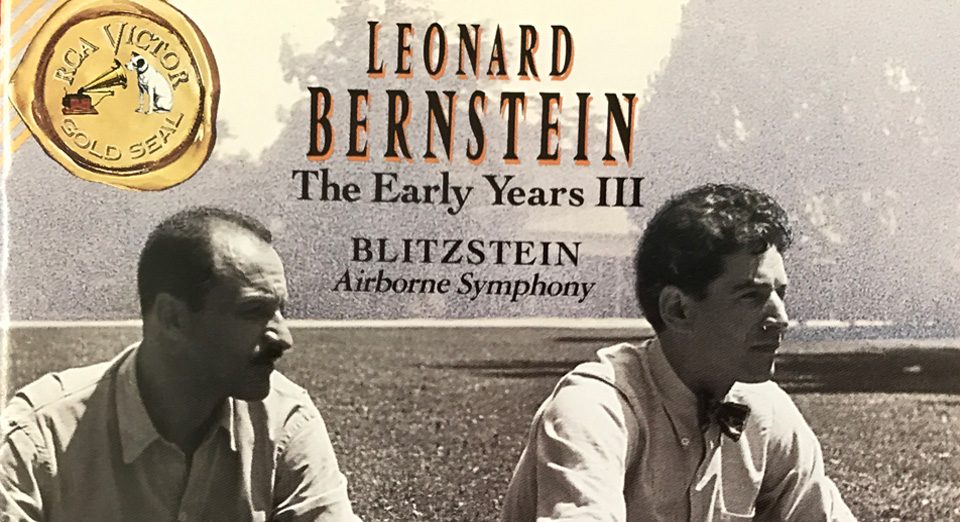
Seventy years ago, on October 30, 1946, renowned conductor and composer Leonard Bernstein took his New York City Symphony and Robert Shaw’s Collegiate Chorale into the recording studio to make a permanent document of his colleague Marc Blitzstein’s Airborne Symphony for RCA Victor. The seven 78 rpm disks were released the following May as a “recordrama” set “stylishly packed in a Recordstory format” with the complete text, priced at eight dollars.
In August 1942, at the age of 37, well-known American Communist composer Marc Blitzstein enlisted in the United States Army and was assigned as an “entertainment specialist” attached to the U.S. Army Eighth Air Force and based in London. He had become famous overnight in June 1937 when his pro-labor musical The Cradle Will Rock made headlines for bolting from the Federal Theatre Project after the government tried to block its opening. Early in 1941 he premiered his next big theatre work, the opera No for an Answer, dealing with fascist-minded influences acting against the labor movement in America.
In London Blitzstein helped organize musical programming for the American Broadcasting Station in Europe (ABSIE), and composed the short concert piece Freedom Morning, premiered at Royal Albert Hall on a goodwill program that featured renowned African American tenor Roland Hayes and a chorus of U.S. Black servicemen whom Blitzstein coached in a group of spiritual arrangements.
During this time, exposed to the efforts at Allied air bases from whence bombers flew out over German targets, Blitzstein had the idea to compose a long symphonic work for orchestra and men’s chorus that would recount the history of human yearning to fly – to be airborne – and now win the war against fascism. When he returned to the U.S., his good friend, the young composer and conductor Leonard Bernstein, urged him to complete it, and Bernstein would program it for his New York City Symphony.
The choral symphony comprises mythology (Icarus), history (the Wright Brothers), politics (the rise of Nazism), war (the cities destroyed by fascism, beginning with Guernica), resistance (“Are you coming? We can hold out. Are you coming?”), quiet reflection (“Morning Poem” of a solitary flier on a practice run), preparation and waiting (“The Ballad of Hurry-Up”), a “Ballad of the Bombardier,” the movement to “Open up that Second Front!” to relieve the pressure off the USSR to German’s east, Allied victory, and a final warning to history: “Watch this victory. Whose victory? Whose glory? Shall men, once again ready to resume the conquest of the skies, once again be stopped? Once again create – the enemy?”
Bernstein premiered the work on April 1, 1946, at New York’s City Center, with Orson Welles as the Monitor (narrator) of the hour-long cantata. Critical reviews were mixed but mostly positive. In the Daily Worker, Louis Harap cited the triumph of the piece as “a major event in American music history…. To say that this is the finest musical to come out of the war from an American composer is not enough. It is among the best to emerge from the war from any country.”
Composer Wallingford Riegger, writing in New Masses, called Blitzstein’s text “the product of an enlightened political thinker, endowed with an unusual musical talent and possessed of a boundless faith and an intense purposiveness in communicating his message, not to the select few but to the multitude…, written in a style easily understood by the average GI Joe.”
Esteemed theater critic Harold Clurman spoke of the Airborne as “the best show in town.” “The success of this piece is salutary. It is good for American music. It is good for our public to hear the actual find direct expression in the concert hall as it found expression once in the theater (Waiting for Lefty, The Cradle Will Rock, etc.)…. Even what is ‘corny’ and pretentious in the Airborne is part of an American consciousness trying to find itself amidst the ubiquitous commercialism in which the ambitious artist must perforce live.”
Blitzstein received both the 1946 Music Critics Circle Award and the Page One Award of the Newspaper Guild of New York for the work, and its text was published in Radio’s Best Plays.
Harap’s assessment of the enduring significance of the Airborne still stands. There is no other comparable work in dimension or passion which can compete with Blitzstein’s only symphony as the major American work from World War II. Bernstein made a later recording of the Airborne on LP, and both the first and second recordings are still available.
For a time, in the 1990s, the newly emerging gay men’s choruses around the country programmed the Airborne as a huge and powerful work written for male chorus, and also as a tribute to the composer, who was himself homosexual. “The Ballad of Hurry-Up,” describing preparations for an aerial sortie and the crew elaborately putting on their uniforms, and then undressing – a kind of military striptease – when the sortie is canceled, can be viewed today as a clearly homoerotic passage in the cantata.
In the late 1940s Blitzstein, as an active Communist Party member, was active in the short-lived American-Soviet Music Society, along with fellow musicians Bernstein, Aaron Copland, Morton Gould, Elie Siegmeister and Serge Koussevitzky, in an effort to preserve the wartime alliance and avert the new Cold War which the Airborne had specifically warned against.
Blitzstein went on to write the opera Regina, based on Lilian Hellman’s play The Little Foxes, and Juno, based on Sean O’Casey’s play Juno and the Paycock. He was also the translator of Kurt Weill and Bertolt Brecht’s Threepenny Opera. He was working on an opera about Sacco and Vanzetti at the time of his death in 1964 at the age of fifty-eight. Although he left the Communist Party in 1949, he remained committed to radical politics for the rest of his life.
Movements from the Airborne Symphony can be heard on YouTube, such as “The Ballad of Hurry Up” linked above.
Source: Eric A. Gordon, Mark the Music: The Life and Work of Marc Blitzstein.










